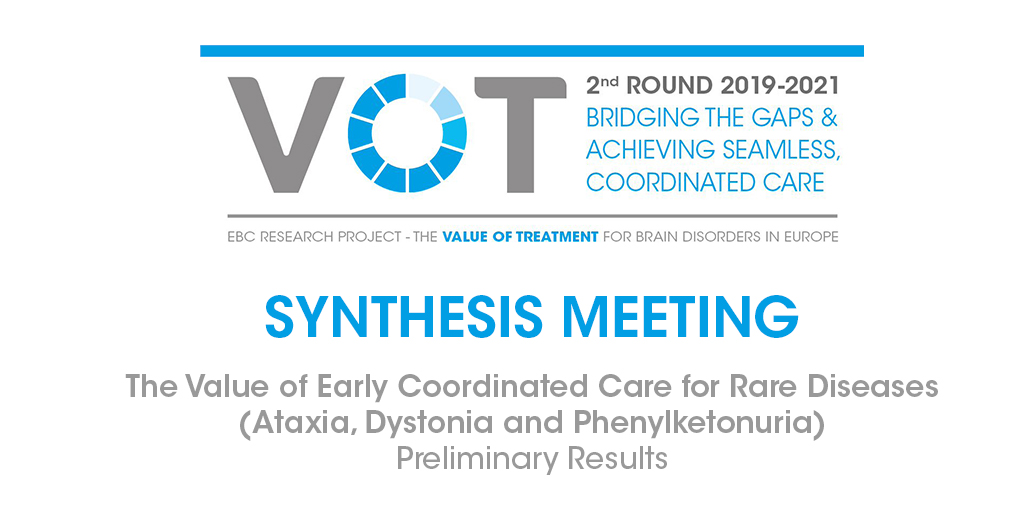
The Value of Treatment for Brain Disorders: Case Studies on Rare Diseases & Mental Disorders present findings at Synthesis Meeting
08 June 2021
Neuroscience News, Society & Partner News

The Value of Treatment for Brain Disorders (VOT) is a health economics and outcomes research project coordinated by the European Brain Council (EBC). EBC conceptualized the Value of Treatment research framework to address the increasing burden of brain disorders – both neurological and mental alike.
Budgetary restrictions across the EU are threatening the sustainability of the European social welfare model as a whole and make it even more important to achieve cost-effectiveness in the use of resources in health systems and its deliverables. In particular, challenges are multiple because of the medical, social and economic impacts of chronic disabling conditions. The long-term and transversal nature of care and treatment for mental and neurological disorders have all served to confound hospital traditional and top-down led responses towards care provided in more than one setting. Together, these emphasize the need for an ambitious patient-empowering research policy and an integrated, multidisciplinary approach to brain disorders looking at payment systems and healthcare digitalization as an innovative boost. Risk reduction, preclinical and early detection, and timely intervention are seen as the solutions to help society cope. In 2019, in order for the research to dig deeper into the current unmet needs in health care using a value-based approach, a second round (VOT2) on new therapeutic areas was launched; focusing on The Value of Early Coordinated Care for Rare Diseases (Ataxia, Dystonia and Phenylketonuria) and The Value of Early Intervention and Continuity of Care for Mental Disorders (Anorexia Nervosa, Autism Spectrum Disorder, Major Depressive Disorder).
Advancing Patient Outcomes: The Value of Early Diagnosis and Coordinated Care for Rare Diseases
Motivated by addressing the existing gaps in the care pathways, the EBC Study on Ataxia, Dystonia and Phenylketonuria (PKU) study objective was to assess the benefits of early coordinated care and treatment, multidisciplinary care patterns (also addressing comorbidity) and health care providers education on outcomes to patients and costs.
Common to almost all rare diseases is that there is no cure and management focuses on timely diagnosis, disease-modifying therapies with different mechanisms of action, symptomatic therapies or other supportive therapies, or surgical procedures such as deep brain stimulation, rehabilitation and social care.
The case studies have highlighted the complexity of care needs for many people living with Ataxia, Dystonia or PKU, and the need for early diagnosis, adequate treatment and care coordination both within and across medical domains.
Advancing Patient Outcomes: The Value of Early Intervention and Continuity of Care for Mental Disorders
Motivated by addressing the existing gaps in the care pathways, the EBC Study on Anorexia Nervosa (AN), Autism Spectrum Disorder (ASD) and Major Depressive Disorder (MDD) has been assessing the benefits of early continuity of care and treatment, and collaborative care patterns (also addressing mental health problems with comorbid medical conditions) on outcomes to patients and costs.
Anorexia Nervosa, Autism Spectrum Disorder and Major Depressive Disorder all share similar challenges: delayed detection; barriers to access specialized care and treatment options and a high psychosocial burden – burden increasing with the severity of disability.
The case studies have highlighted the importance and cost-effectiveness of early interventions and treatment for people with AN, ASD or MDD in several European countries, examining also the effective implementation of collaborative care patterns, care continuity across services and integrated care pathways.
EBC together with its members (EAN, EANS, ECNP, EFNA, EPA, EPNS, EUFAMI, FENS, GAMIAN Europe, IBRO) and experts who are participating in the research convene today to present a synthesis of the VOT2 research project results so far, to be followed by the release of an overarching policy paper on 7 December 2021 and by scientific publications.